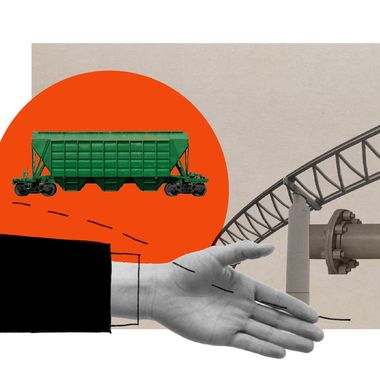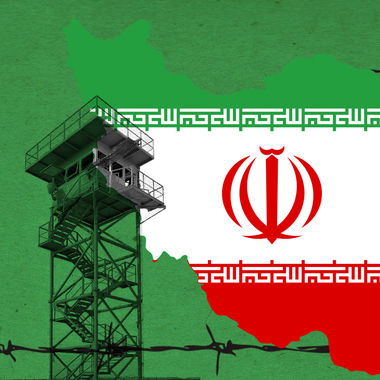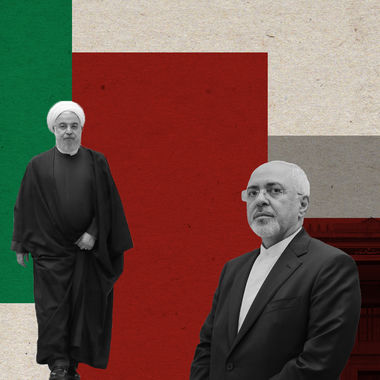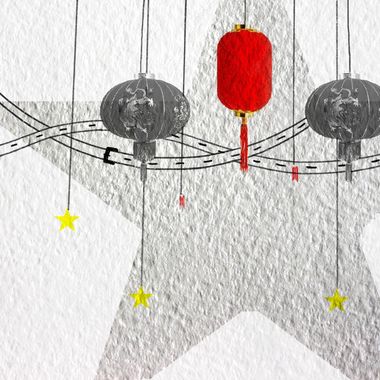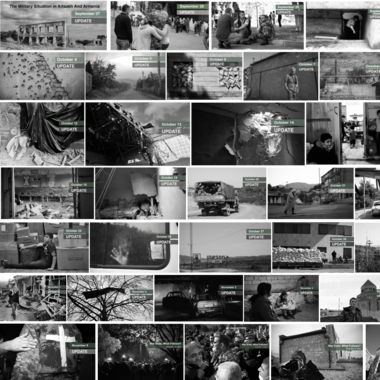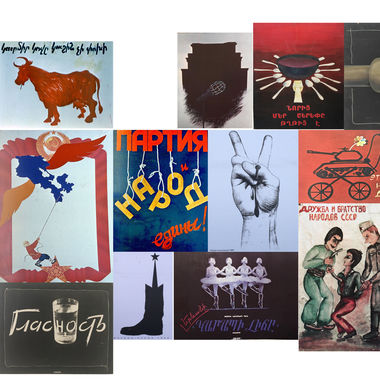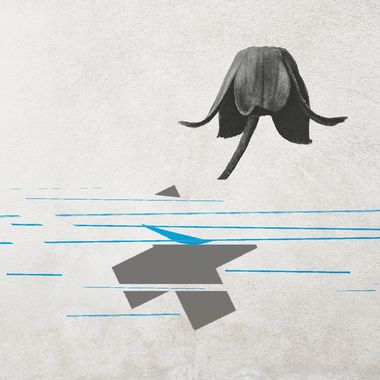Wed Oct 06 2021 · 12 min read
The Escalating Tensions Between Iran and Azerbaijan

By Hranoush Dermoyan

Illustration by Armine Shahbazyan.
Not even a year after the 2020 Artsakh War ended, the South Caucasus is facing a new challenge. This time, relations between Iran and Azerbaijan are being severely tested. In recent weeks, there has been hardline rhetoric on both sides. The peak so far has been large-scale military drills conducted by Iran on its border with Azerbaijan.
To understand why events have unfolded as they have and what may happen in the future, it is important to regard the current strained relations between Iran and Azerbaijan in its historical, regional and geopolitical context.
Iran and Azerbaijan: Ethnic Ties and Political Differences
Around 16 percent of Iran’s population are ethnic Azerbaijanis, who mainly inhabit the northern and northwestern areas of the country.
In its north, Iran has two provinces named Western Azerbaijan and Eastern Azerbaijan. The name of those regions derives from Atropatene, a region which was ruled by Persian satraps (lords) after the fall of the Achaemenid Empire around the 4th century B.C. and was incorporated into the territory of the Persian Empire around the 2nd century B.C. In the 19th century, the 1813 Treaty of Gulistan and 1828 Treaty of Turkmenchay set the Araks River as the border between the Russian Empire and Iran.
Under Russian rule, the Muslim population of the area that is modern-day Azerbaijan were grouped as “Shirvanis”, “Caucasian Tatars”, “Turks” or simply “Muslims” by foreigners. The Muslim population identified itself as either Turks or Persians.[1]
Although Azerbaijan's strongest ally in the region is Turkey, and the two countries like to refer to themselves as “one nation, two states”, Azerbaijan is majority Shia Muslim, while Turkey is a majority Sunni country. Azerbaijan’s elite is largely secular due to its Soviet past. Moreover, Azerbaijan has accused Iran many times of exporting its brand of Shia Islam into Azerbaijan, while Iran has accused Azerbaijan of spreading its nationalistic ideas into Iran.
A new generation of Azerbaijani intellectuals, most representing the Sunni minority, started toying with pan-Turkic ideas in the mid-19th century; it was only in the late 19th century that they proposed using the name “Azerbaijani Turks” instead of Trancaucasian Muslims. The collapse of the Russian Empire and the emergence of the Soviet Union laid the foundations for the modern Azerbaijani state and Azerbaijani national identity. Although nowadays Azerbaijan portrays itself as more Turkic than Iranian, nonetheless it has strong historical, cultural and religious ties to Iran.
Iran and the Nagorno-Karabakh Conflict: Overview
The collapse of the Soviet Union created new realities in the region. For much of the 20th century, Iran had to deal with the Soviet Union as a neighbor. By the end of the century, Iran had three new neighbors in the region (Armenia, Artsakh and Azerbaijan) and had undergone an Islamic revolution.
The First Nagorno-Karabakh War, and the resulting status quo that remained in place for three decades, prompted Iran to conduct a balanced foreign policy in the region, as it was host to both Armenian and Azerbaijani populations. The frozen conflict was also a good opportunity for Iran to have leverage and influence in the South Caucasus.
Iran always recognized Azerbaijan’s territorial integrity and viewed the seven regions that came under Armenian control during the First Nagorno-Karabakh War but were not part of the Nagorno-Karabakh Autonomous Oblast during the Soviet era as part of Azerbaijan. However, it also maintained good relations with Armenia. The status quo which had been in place from 1994 to 2020 was beneficial for Iran. Azerbaijan has no land connection with its exclave Nakhichevan, and Iran serves as a link between mainland Azerbaijan and Nakhichevan. Turkish trucks also traveled through Iran to reach Asian markets. With the new realities in the region, if Azerbaijan is given any type of transportation corridor through Armenia, Iran will be further isolated in the region. Azerbaijan would have a link with Nakhichevan and its closest ally Turkey through Armenia. Turkey would also have direct access to the Caspian region and the Turkic Central Asian republics beyond.
The Israeli Factor in Iranian-Azerbaijani Relations
As much as Iran tries to maintain good relations with Azerbaijan, several factors make the relationship thorny. One of the important points in Iranian-Azerbaijani relations is Azerbaijan’s close relations with Iran’s enemies, namely the U.S. and Israel, as well as Turkey, which is also a rival for Iran in the region. The Islamic Republic has long accused Azerbaijan of providing fertile ground for U.S. and Israeli intelligence operations aimed at weakening its regional position and nuclear program in particular.
Iran is more affected by Azerbaijan’s close relations with Israel than with the U.S. For years, Azerbaijan has developed and strengthened bilateral relations with Israel, mainly in the sphere of arms deals. During the 2016 Four Day April War, as well as during last year’s war, Azerbaijan deployed various Israeli-made weapons. However, Azerbaijan also supplies 40 percent of Israel’s oil.
Tel-Aviv and Baku established diplomatic relations in 1992. Since then, Azerbaijan has purchased $7 billion worth of weapons from Israel. For Azerbaijan, relations with Israel also enable it to balance its relations with Iran. Israel benefits from the relationship with Azerbaijan because it has direct access to Iran for intelligence operations.
The 2020 Artsakh War and Iran
The igniting of the 2020 Artsakh War left Iran between a rock and a hard place, disrupting Iran’s balanced relations with Armenia and Azerbaijan.
According to Dr. Hamidreza Azizi, a visiting fellow at the German Institute for International and Security Affairs (SWP), Iran’s approach to the war was reactive rather than pre-planned. Iran was not expecting a flare-up of the conflict and had been benefiting from the status quo.
Fearing that the new war could change the power balance in the region, and to be involved in the new division of power, Iran came up with its peace plan during the 2020 Artsakh War and presented it to Azerbaijan and Armenia, as well as Russia. Although all parties involved announced that they would consider Iran’s plan, in the end, Russia and Turkey were the ones that settled the conditions for the end of hostilities.
Iran continued its balanced approach to the conflict during the war, urging both sides to cease hostilities and respect the principles of territorial integrity, as well as the rights of the Karabakh Armenians. Upon the outbreak of hostilities on September 27, Iran’s Foreign Minister Javad Zarif tweeted that Iran was closely monitoring the alarming violence in Nagorno-Karabakh. Iran called for an immediate end to hostilities and urged the sides to resort to dialogue for resolving differences. The latter also showed readiness to provide necessary conditions to enable talks.
During the war, Azerbaijan accused Iran of allowing Russia to deliver weapons to Armenia and Artsakh, which Iran denied.
Several stray rockets and shelling from fighting in Nagorno-Karabakh hit border regions, including residential areas in Iran. In one of those incidents, a 6-year-old was injured. Iran announced that it will not tolerate the conflict spilling over into its territory.
One week into the war, reports came that Turkey had sent mercenaries from jihadist groups in Syria to fight for Azerbaijan. Iran’s reaction against the involvement of mercenaries was also harsh.
With shells flying into its territory and mercenaries looming near its border, Iran deployed forces on its northern borders with Armenia and Azerbaijan in mid-October 2020.
While Iran tried to maintain neutrality during the war, Iran’s Azerbaijani population pressured the government to show support for Azerbaijan. In several large Azeri-populated cities, rallies were held in support of Azerbaijan.
After the Moscow-brokered ceasefire, which ended the 2020 Artsakh War, Iran was quick to congratulate Azerbaijan over its victory and for restoring its territorial integrity. The Iranian government even offered to help develop the newly-acquired regions, and Aliyev announced that any investments by friendly countries are welcome.
However, this does not leave out the fact that Iran is facing major challenges with the new geopolitical situation in the region. The challenges that Armenia faces in the aftermath of the war and with the tripartite agreement of November 9 are also concerning for Iran, such as the persistence of the Turkish-Azerbaijani tandem to interpret the opening of communication routes as the opening of the so-called “Zangezur corridor” and imposing delimitation and demarcation of Armenian-Azerbaijani borders under continued Azerbaijani aggression.
Moreover, Russia and Turkey have increased their presence in the region. Russia has officially deployed peacekeeping troops in Artsakh, and there is a joint Russian-Turkish center operating in Aghdam to oversee the ceasefire. Furthermore, Turkey hopes to get direct access to Azerbaijan and the Central Asian Turkic countries once communication routes open in the region.
Iran is also concerned about the pan-Turkic threat. While participating in a victory parade organized by Azerbaijan on December 10, to mark its victory in the 2020 Artsakh War, Turkish President Recep Tayyip Erdogan recited an Iranian-Azerbaijani poem about the division of Azerbaijan’s territory between Russia and Iran in the 19th century. The poem describes how the Azerbaijani people were divided by the Araks River. Iran’s state ISNA news agency viewed Erdogan’s recital of the poem as a symbol of pan-Turkism. Iran’s Ministry of Foreign Affairs issued a statement saying Iran will not allow anyone to meddle with its territorial integrity. Iran’s reaction to the recital of the poem was not well received in Turkey. Turkey’s Minister of Foreign Affairs Mevlut Cavusoglu had told his Iranian counterpart that the poem was about Karabakh and that Erdogan was not referring to Iran.
The Current Tension Between Tehran and Baku
Against this backdrop, tensions between Iran and Azerbaijan have been building up in the last few months.
Turkey, Azerbaijan and Pakistan launched joint military exercises in various parts of Azerbaijan in mid-September 2021, aimed at further strengthening the existing ties between the armies of the three countries. Iran did not welcome the military drills under its nose and Supreme Leader Ayatollah Ali Khamenei’s representative issued a warning, stating that Azerbaijan should refrain from “playing with the lion’s tail.”
Around the same time, Azerbaijan set up a police checkpoint on a stretch of the Goris-Kapan highway that it controls and started stopping Iranian truck drivers and charging them a road tax. The Azerbaijani government justified its actions by saying Azerbaijan charges a road tax from foreign vehicles crossing its territory and its border guards are just imposing the law over Azerbaijan’s entire territory. Azerbaijan had been angered by Iranian trucks traveling into Artsakh.
Following the arrest of two Iranian truck drivers by Azerbaijani police, Iran demanded their immediate release. Later, Iran announced that the Azerbaijani authorities could have warned Iran about the introduction of the road tax.
At the end of September 2021, Iran conducted military drills on its border with Azerbaijan; almost no information was released about it. On September 28, the head of the Islamic Revolutionary Guard Corps (IRGC) in Tabriz, Colonel Hossein Pursmail said that “the repetition of Israel's threats against Iran through the mouth of the Republic of Azerbaijan is not only not in the interests of Baku, but is also a threat to their very existence.”
Three days later, Iran launched another set of military drills near the border with Azerbaijan, which were of a much larger scale this time.
Iran announced that it is its sovereign right to hold military exercises on its territory. Iran’s tough rhetoric followed Ilham Aliyev’s interview with the Turkish Anadolu News Agency. He announced that, while it is a country’s right to conduct military drills within its borders, the Azerbaijani government and the public are surprised why the exercises are happening now, as they are unprecedented in the last 30 years. He also wondered why Iran did not conduct any military exercises on its northern borders when they were controlled by Armenian forces.
Following the launch of military exercises, Iranian Foreign Minister Hossein Amirabdollahian announced on October 3 that Iran will not tolerate an Israeli presence nor geopolitical change in the region. At the same time, he stated that “the relationship between the people of both countries was at the highest status and political ties between the states were growing.” Iran’s Foreign Affairs Minister Hossein Amirabdollahian also announced that foreign actors, the Israeli regime, and terrorist groups were behind developments in Azerbaijan, and Iran would help its neighbor not to get caught in this trap.
The military exercises are a show of force from the Iranian side, indicating it will not shy away from solving issues through military means.
Iran’s parliamentarians also issued a joint statement on October 3 announcing their support of the military drills taking place on the country’s northern border. The statement underlined that any geopolitical change in the region and the change of any of its borders with neighbors is a red line for Iran, and it will not refrain from responding to foreign actors in the region. At the same time, the parliamentarians announced that Iran will not tolerate any country in the region serving the activities of the “Zionist” regime. They stated that the military drills along the Araks River send a message of strength and peace and are a warning for Israel.
In response to Iran’s recent announcements, Azerbaijan’s Foreign Ministry issued a statement the following day claiming that Iran’s statements about the presence of a third force in Azerbaijan near its borders are unfounded and that the Azerbaijani side has not been presented with any evidence proving the existence of foreign forces in the country. The Azerbaijani side also noted that its regions bordering Iran “had been occupied by Armenians for 30 years” and Azerbaijan did not hear Iran’s criticism over “the occupation of their lands.”
Ilham Aliyev touched upon the Iran-Azerbaijan confrontation again during his visit to Jabrayil on October 4. He announced that, while Azerbaijan has good intentions, it will not tolerate unfounded accusations. “I am saying this to the people of Azerbaijan and to the world, baseless accusations against us will not stay unanswered,” Aliyev said. He demanded proof of Iran’s accusations, saying “if there is no evidence, everyone who held unfounded accusations against us will be held accountable.”
The day before Aliyev’s speech in Jabrayil, Iran’s Supreme Leader Ali Khamenei had defended the military drills organized by Iran on its northwestern borders, stating that “the issues concerning Iran's northwestern neighbors should be resolved wisely, through the cooperation of the armies of neighboring countries and by avoiding the presence of any foreign military forces.” Khamenei urged neighboring countries to “stay independent” and “join forces” and said that the presence of foreign forces in the regions will lead to destruction.
On October 5, Iran denied the use of its airspace for the flight of a military plane from Nakhichevan to Baku. According to the Azerbaijani APA news agency, Iran informed the Azerbaijani side through official channels that the flight of an aircraft carrying military equipment to Nakhchivan would not be permitted to cross its territory. The agency also stated that Baku announced that the ban will not affect Azerbaijan heavily, as the latter uses other transportation routes as well. Azerbaijan called Iran’s action a betrayal of Azerbaijan at the behest of Armenia.
On the same day, the office of Iran’s Supreme Leader Ali Khamenei’s representative was closed in Baku in connection with COVID-19 safety concerns.
Armenia is closely following the events unfolding between Iran and Azerbaijan, considering Iran a close friend in the region. Armenia has been trying to balance relations with rivals U.S. and Iran for years. During his official visit to Lithuania on October 3, Armenia’s Prime Minister Nikol Pashinyan announced that Armenia will never get involved in conspiracies against Iran, as some Iranian news agencies have claimed. Pashinyan stated that Armenia will never forget that Iran was a “lifeline” for the country at the beginning of the 1990s, after both Turkey and Azerbaijan imposed a blockade on Armenia.
In an interview with Iranian Irna News Agency, given on October 5 within the framework of his visit to Iran, Armenia’s Foreign Affairs Minister Ararat Mirzoyan announced that Iran’s role and potential in easing tension and establishing stability in the region is clear, and Iran’s stance on the inviolability of the borders of Armenia proves that. Mirzoyan also stated that Iran’s further involvement in the region will ensure peace, security and prosperity.
It is yet to be seen how the tense situation between Iran and Azerbaijan will unfold. While Iran criticizes certain actions by Azerbaijan, it also makes sure to state that it maintains good relations with Azerbaijan and that good relations with Azerbaijan are important for Iran.
Iran’s territory is 19 times bigger than the territory of Azerbaijan, and its population exceeds that of Azerbaijan 8 times. As of 2020, Iran’s military expenditures amounted to almost $16 billion, while the military expenditure of Azerbaijan was a little over $2 billion. According to World Bank data, Iran’s armed forces personnel numbers over 600,000, and Azerbaijan’s is over 80,000. Although military escalation is unlikely to happen between the two countries, it would have devastating consequences not only for Armenia but for the entire region.
------------------
[1] Shaffer, B., Borders and Brethern: Iran and the Challenge of Azerbaijani Identity (1st ed.). MIT Press, 2002.
Also see
Armenia and Azerbaijan Take Fight to ICJ
By Gabriel Armas-Cardona Esq.
Armenia instituted proceedings against Azerbaijan at the International Court of Justice on the basis of violations of the Convention on Elimination of Racial Discrimination. A week later, Azerbaijan submitted its own claim against Armenia. Gabriel Armas-Cardona breaks it down.
What Is France Looking for in the Nagorno-Karabakh Issue?
By Gaïdz Minassian
Since the 2020 Artsakh War, France has been at the forefront of diplomatic activity in resolving the Nagorno-Karabakh conflict. What goal is Paris hoping to achieve with this issue that is so far removed from the concerns of the French?
Related articles
Armenia Eyes Infrastructure Cooperation With Iran
By Arthur Manukian
As Armenia seeks to develop a new national security framework following the defeat in the 2020 Artsakh War, relations with Iran could play an increasingly important role.
Iran’s Response Following Azerbaijan's Offensive in Artsakh
By Anna Gevorgyan
While Iran's response to the current escalation is neutral and balanced, there are concerns about Azerbaijan's desire for a military solution, Turkey's involvement and the arrival of terrorists in the region.
Nagorno-Karabakh and Iranian Public and Foreign Policy
By Hamed Kazemzadeh
The 2020 Karabakh War has had regional implications for neighboring countries, specifically on Iranian public and foreign policy. Hamed Kazemzadeh looks at the internal and external dimensions of Iran’s stance.
Post-War Artsakh: The View From Moscow and Tehran
By Areg Petrosyan
The 2020 Artsakh War highlighted the interests, strategies and positions of Iran and Russia, both regional powers, regarding the resolution of the Karabakh Conflict.
Was China All Innocent During the 2020 Artsakh War?
By Paruyr Abrahamyan
China considers Turkey a key strategic partner under the Belt and Road Initiative. It has also intensified economic relations with Azerbaijan and is keen to diversify its commercial routes to Europe. Was China a silent observer or did it have any role to play during the 2020 Artsakh War.
New on Spotlight Karabakh
A Chronology of the 44 Days of War
Today, September 27, marks the one year anniversary of the start of the 2020 Artsakh War. Here is a chronology of the 44 days of war and beyond that we published last year.
Breaking the Immunity of Dictators
By Irina Ghaplanyan
Dictators are emboldened by the silence of those who claim to be proponents of human rights and justice. Turkey’s Erdogan and Azerbaijan’s Aliyev must be held accountable for war crimes and crimes against humanity, writes Irina Ghaplanyan.
The Guardian Women of the Front Lines
By Kushane Chobanyan
While the majority of women didn’t pick up guns to fight in the war, many used their skills to fight in their own way. On this first anniversary of the 2020 Artsakh War, Kushane Chobanyan presents the stories of six extraordinary women who were on the front lines.



